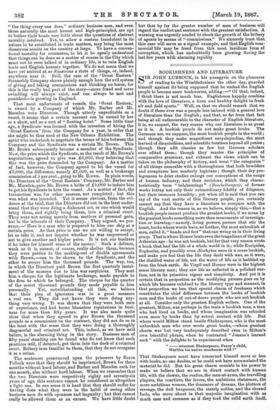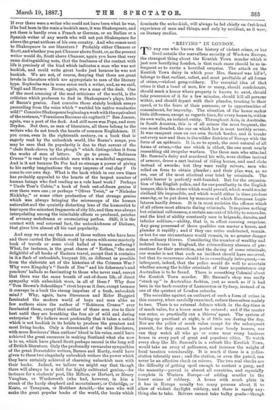BOOKISHNESS AND LITERATURE.
SIR JOHN LUBBOCK, in his panegyric on the pleasures of reading to the Wimbledonians the other day, guarded himself against its being supposed that he wished the English people to become mere bookworms, adding :—" Of that, indeed, I think there is not much fear. Englishmen happily combine with the love of literature, a keen and healthy delight in fresh air and field sports." Well, on that we should remark that we doubt if there ever was a people less imbued with a general love of literature than the English; and that, so far from that fact being at all unfavourable to the character of English literature, it is, we suspect, the very reason why our literature is as great as it is. A bookish people do not make great books. The Germans are, we suppose, the most bookish people in the world ; and though they make magnificent encyclopfediae, the most learned of disquisitions, and scientific treatises beyond all praise; though they edit classics as few but German scholars ever edited them; though they master the principles of comparative grammar, and exhaust the views which can be taken on the philosophy of history, and treat "the categories" of all things nameable with a thoroughness that both bewilders and enraptures less masterly logicians ; though their dry pro- legomena to drier studies enlarge our conceptions of the range of human industry, and their revisions, which they charac- teristically term " belabourings " (Bearbeitungen), of former works betray not only their extraordinary fidelity of diligence, but their immense humility ; yet when all is said that you can say of the vast merits of this literary people, you certainly cannot say that they have a literature to compare with the English. And the reason is, as we believe, simply this,—that a bookish people cannot produce the greatest hooks, if we mean by the greatest books something more than monuments of investiga- tion or learning,—namely, living powers, powers that stir the heart, books whose words have, as Luther, the most unbookish of men, called it, "hands and feet" that can wring us in their living grasp. That is where Homer beats even the tragedians of the great Athenian age : he was not bookish, but for that very reason wrote a book that had the life of a whole world in it; while Euripides, Sophocles, and possibly even /Eschylus were in a sense bookish, and Make you feel that the life they dealt with was, as it were, the distilled water of life, not the water of life as it bubbled up from the fresh earth. So Virgil and Horace were in the highest sense literary men; they saw life as reflected in a polished sur- face, not in its primitive vigour and simplicity. And yet it is certain that in proportion as the modifying process goes on by which life becomes subdued to the literary type and manner, in that proportion we lose that special charm of freshness which constitutes the chief difference between the books of bookish men and the books of ont-of-doors people who are not bookish at alL Confider only the greatest English writers. One of the greatest, Milton, was perhaps in the main a bookish man, a man who had lived on books, and whose imagination was schooled even more by books than by actual contact with life. But where would Milton stand beside Shakespeare, who is the most unbookish man who ever wrote great books,—whose greatest charm was but very inadequately described even in Milton's own beautiful phrase, when he contrasted " Jonson's learned sock" with the delights to be experienced when
" — sweetest Shakespeare, Fancy's child, Warbles his native woodnotes wild P"
That Shakespeare must have concerned himself more or less with books, no one doubts, or he could not have accumulated the material be did. But his great charm consists in his power to make us believe that we are in direct contact with human life, with the clowns, the rustics, the men-at-arms, the travelling players, the courtiers, the lovers, the ambitions statesmen, the more ambitious women, the dreamers of dreams, the plotters of revenge, the dull burgesses, the stately nobles, and the shrewd fools, who move about in that majestic imagination with as mach ease and sureness as if they trod the solid earth itself.
If ever there were a writer who could not have been what he was, if he had been in the main a bookish man, it was Shakespeare, and yet there is hardly even a French or German, or an Italian or a Spanish writer of any worth who will not put Shakespeare far above the great authors of his own country. And who comes next to Shakespeare in our literature ? Probably either Chaucer or Scott, and whether you put Chaucer above Scott, or, as the present writer would do, Scott above Chaucer, again you have that very same distinguishing note, that the freshness of the contact with life is precisely of the kind which indicates a man who was not bookish, and could write great books just because he was not bookish. We are not, of course, denying that there are great levels in literature which are appropriate to men of the literary type. Sophocles was in some sense such a writer, and, as we said, Virgil and Horace. Bacon, again, was a man of the desk. One of the most amazing of the mad criticiems of the world, is the criticism which professes to find in Shakespeare's plays, hints of Bacon's genius. just conceive those stately bookish essays proceeding from the voice which " warbled his native woodnotes wild !" Conceive Shakespeare beginning a work with the eq nivalent of the sentence, "Francis= Baconns sic cogitavit !" Ben Jonson, again, was a poet of the desk. And still more was Pope, and even Dryden. But then, as men of literature, all these belong to the writers who do not touch the hearts of common Englishmen. If you come, even in the eighteenth century, on a book that is eagerly read by the unbookish world, like Berne's songs, you may be sure that its popularity is due to that savour of the "clods fresh-cloven by the plough" which distinguishes it from the works of men of letters. Or go to prose. "Robinson Crnsoe " is read by unbookieh men with a wonderful eagerness. And is it not because De Foe had so strange a power of giving to his earthy imaginations the very impress of real clay P Or come to our own day. What is the book which in our own times has probably appealed to the hearts of the largest number of human beings who find reading as a rule hard work ? Perhaps "Uncle Tom's Cabin," a book of fresh out-of-doors genius if ever there were one ; or perhaps "Oliver Twist," or "Nicholas Nickleby," or some other production of that strange genius which was always bringing the microscope of the human naturalist and the quaintly distorting lens of the humonrist to bear upon the minutest fragments of city life, and then was always interpolating among the inimitable effects so produced, patches of screamy melodrama or excruciating pathos. Still, it is the contact with real external fact, the unbookiehness of Dickens, that gives him almost all his vast popularity.
And may we not say the same of those writers who have here and there carried the British world by storm with some masterly book of travels or some vivid ballad of human suffering ? What, for instance, is the great charm of " Eothen," the most delightful of all books of Eastern travel, except that it contains in it a flash of unbookish, buoyant life, as different as possible from the elaborate art of the historian of the Crimean War ? Why were Kingsley's " Sands of Dee" and his fishermen's and poachers' ballads so fascinating to those who never read, except that there was the same breath of out-of-doors life, of direct sympathy with unbookish woes, in all of them ? Why does "Tom Brown's Schooldays" rivet boys as it does, except because it conveys in a book the strong impulses of a fresh, unbookish mind ? Why, again, have Stevenson and Rider Haggard fascinated the modern world of boys and men alike as few authors since the author of "Robinson Crusoe" ever fascinated them, except that neither of these men rise to their best until they are breathing the free air of wild and daring enterprise ? We believe most profoundly that it takes a nation which is not bookish in its habits to produce the greatest and most living books. Only a descendant of the wild Borderers, with more Borderers' than authors' blood in his veins, could have achieved the great successes in making Scotland what she now is to us, which have placed Scott perhaps second in the long roll of British literature. Only the profoundly vernacular sympathies of the great Dorsetshire writers, Barnes and Hardy, could have given to these two singularly unbookish writers the power which they have certainly achieved of charming unbookish men with their books. Indeed, we believe we might say that though there will always be a field for highly cultivated genius,—for instance for a students' poet, like Milton, or Herbert, or Henry Vaughan, or Wordsworth (who had, however, in him a streak of the hardy shepherd and mountaineer), or Coleridge, or Keats, or Tennyson, or Matthew Arnold,—the men who will make the great popular books of the world, the books which dominate the unbookish, will always be fed chiefly on first-hand experience of men and things, and only by accident, as it were, on literary studies.



































 Previous page
Previous page